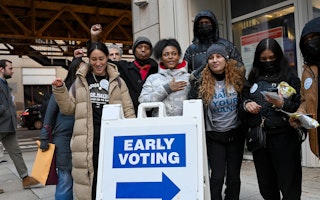The civil-rights movement of 1960s was a major watershed in U.S. history not only because it ultimately led to important social reforms, but also because it ushered in a new paradigm in the process of community organizing and influencing change from the grassroots level. Nearly four decades later, civil society and advocacy groups that focus on issues from immigrant rights to urban education continue to grapple with how best to accommodate this shift toward a more equitable and inclusive form of decision-making that is often at odds with traditional hierarchical management structures.
At a forum at OSI's New York offices on February 13, 2003, four panelists all of whom have extensive experience in social movements and related organizations discussed the concept of "participatory democracy" at the organization level. According to this theory, civil society groups that claim to represent marginalized or difficult-to-reach communities have a responsibility to make decisions only after thoroughly consulting their clients and staff.
The panelists all agreed that the process of deliberation, in which all concerns are disclosed and addressed, is vital to establishing a trusting, motivated work environment for all involved. The major difficulty for all organizations centers on when, or even if, designated managers need to move forward and implement a policy change regardless of whether consensus has been reached among key staff or clients.
Read more
Online Hate Speech
New SEC Complaint Says Meta Misled Shareholders over Myanmar Hate

A whistleblower complaint to the SEC argues that the social media giant Meta misrepresented its role in fueling violence against Myanmar’s Rohingya—highlighting the need for more platform accountability for online hate.
Civic Engagement
Bolstering Women and Youth, Linchpins of Democracy

Philanthropy has historically underfunded women and youth. Open Society’s new $50 million investment in their engagement addresses that imbalance—and builds on recent surges in civic engagement crucial to the future of American democracy.
Art and Activism
Reimagining January 6th

The insurrection at the U.S. Capitol left him in a cold sweat. Creating a comic book seemed like one way to reach people not obsessively following the news and spark activism to help defend a multicultural democracy.